Equine West Nile Virus Symptoms: Complete Guide for Horse Owners
Introduction
Horses are strong, graceful, and resilient animals, but like humans, they are vulnerable to certain infectious diseases. One of the most concerning conditions horse owners face is West Nile Virus (WNV), a mosquito-borne illness that affects the nervous system. First recognized in the United States in 1999, this disease has since spread widely and remains a serious health concern for equines across North America, Europe, and other regions.
Understanding equine West Nile virus symptoms is critical because early recognition can significantly improve a horse’s chances of recovery. Many horse owners confuse the clinical signs of West Nile virus in horses with other neurological disorders. That’s why it’s important to know not only the warning signs but also the available treatments, prevention strategies, and the role of vaccination in protecting equine health.
In this guide, we’ll cover everything you need to know about equine West Nile virus symptoms, treatment, prevention, vaccines, and side effects, so you can safeguard your horse effectively.

What is West Nile Virus in Horses?
West Nile Virus is a mosquito-borne disease caused by a flavivirus. When infected mosquitoes bite horses, the virus can enter the bloodstream and travel to the central nervous system, where it causes inflammation of the brain and spinal cord.
While many horses bitten by infected mosquitoes may not show illness, a significant percentage develop neurological disease. This makes recognizing equine West Nile virus symptoms extremely important for timely veterinary care.
How Horses Get Infected with West Nile Virus
- Mosquito Transmission – The virus is spread when a mosquito feeds on an infected bird and then bites a horse.
- Bird Reservoirs – Birds act as the natural hosts of the virus, maintaining its circulation in the ecosystem.
- Seasonal Risk – Infection is more common in late summer and early fall, when mosquito populations are at their peak.
👉 Horses and humans are considered “dead-end hosts,” which means they can get sick but do not spread the disease further.
Equine West Nile Virus Symptoms
Recognizing equine West Nile virus symptoms early can mean the difference between recovery and fatality. The virus primarily affects the nervous system, so the clinical signs of West Nile virus in horses often appear neurological in nature.
Common Symptoms Include:
- Fever and Lethargy – Many horses begin with mild fever, loss of appetite, and general weakness.
- Muscle Twitching (Fasciculations) – Small, localized muscle tremors, especially in the chest, shoulder, or flank, are classic signs.
- Ataxia (Uncoordinated Movements) – Horses may stumble, sway, or have difficulty standing.
- Weakness in Hind Limbs – Often mistaken for lameness, weakness in the hindquarters is a red flag.
- Depression or Listlessness – Horses may seem unusually quiet or reluctant to move.
- Sensitivity to Touch – Some horses show heightened sensitivity or agitation when touched.
- Difficulty Swallowing – Neurological involvement can make chewing and swallowing difficult.
- Partial Paralysis – In severe cases, horses may collapse or be unable to stand.
- Seizures and Death – Though less common, advanced infection can result in seizures and fatal outcomes.
⚡ The severity of equine West Nile virus symptoms varies. About 1 in 3 horses showing neurological disease may not survive, highlighting the importance of rapid veterinary care.
Diagnosis of West Nile Virus in Horses
Veterinarians diagnose WNV through:
- Clinical Observation – Identifying typical neurological symptoms.
- Blood Tests – Detecting antibodies against West Nile Virus.
- Exclusion of Other Diseases – Rule out equine protozoal myeloencephalitis (EPM), rabies, or Eastern equine encephalitis (EEE), which may present similar signs.
Treatment for West Nile Virus in Horses
Unfortunately, there is no specific antiviral drug for WNV in horses. Treatment is supportive and aims to reduce inflammation, control symptoms, and help the horse recover.
Common Treatment Approaches:
- Anti-Inflammatory Drugs – Such as NSAIDs or corticosteroids to reduce brain and spinal cord inflammation.
- Intravenous Fluids – To maintain hydration and support recovery.
- Muscle Relaxants or Anticonvulsants – To control seizures or severe tremors.
- Nutritional Support – Horses may require hand-feeding or tube feeding if swallowing is impaired.
- Rest and Nursing Care – Stabling in a quiet, well-bedded area to prevent injury.
👉 With proper treatment, about 70% of horses with WNV survive, though recovery may take weeks or months. Some horses may have lingering neurological deficits.
West Nile Virus Prevention in Horses
Prevention is far more effective than treatment. Since mosquitoes are the primary carriers, reducing exposure is key.
Effective Prevention Strategies:
- Vaccination – The best line of defense against WNV.
- Mosquito Control
- Eliminate standing water around barns.
- Use fans in stables to deter mosquitoes.
- Apply equine-safe insect repellents.
- Stable Management
- Keep horses indoors during peak mosquito hours (dusk and dawn).
- Install screens in barns and use fly sheets.
- Regular Monitoring – Stay updated on WNV activity in your region.
By combining these steps, horse owners can drastically lower the risk of infection.
West Nile Virus Vaccine for Horses
The West Nile virus vaccine for horses is considered highly effective and safe. It trains the horse’s immune system to recognize and fight the virus before illness develops.
Key Points:
- Types of Vaccines Available: Inactivated (killed) virus vaccines, recombinant vaccines, and combination vaccines.
- Schedule: Initial two-dose series, followed by annual boosters.
- Effectiveness: Significantly reduces the risk of neurological disease, even if exposure occurs.
👉 Veterinarians strongly recommend including the West Nile virus vaccine for horses in every equine vaccination program.
West Nile Virus Vaccine for Horses Side Effects
Most horses tolerate the vaccine well, but mild side effects may occur.
Possible Reactions Include:
- Temporary swelling or soreness at the injection site
- Mild fever or lethargy for 24–48 hours
- Rare allergic reactions (anaphylaxis, hives, difficulty breathing)
⚡ Serious side effects are extremely rare, and the benefits of vaccination outweigh the risks. Always consult your veterinarian if you notice unusual symptoms after vaccination.
Prognosis for Horses with West Nile Virus
- Mild Cases: Recovery within weeks, with minimal long-term effects.
- Moderate to Severe Cases: May take months, and some horses may have permanent neurological damage.
- Fatality Rate: Around 30% for clinically affected horses.
FAQs on Equine West Nile Virus Symptoms
1. What are the first equine West Nile virus symptoms I should look for?
Early signs often include fever, muscle twitching, and hind limb weakness. If you notice ataxia or unusual neurological behavior, contact a vet immediately.
2. How long does it take for symptoms to appear after infection?
Symptoms usually develop 5–15 days after a mosquito bite from an infected insect.
3. Can West Nile virus spread from horse to horse?
No. Horses are dead-end hosts and do not spread the virus to each other or to humans.
4. Is there a cure for West Nile virus in horses?
There is no direct cure. Supportive treatment helps reduce inflammation, control seizures, and improve survival rates.
5. Should all horses get the West Nile virus vaccine?
Yes. Experts recommend that every horse be vaccinated, especially in areas where WNV is prevalent.
6. Are vaccinated horses completely safe from infection?
Vaccination greatly reduces risk, but no vaccine is 100% effective. However, vaccinated horses usually experience milder illness.
7. How can I tell the difference between West Nile virus and other neurological diseases in horses?
Only a veterinarian can confirm through diagnostic testing. Diseases like EPM, rabies, and EEE can mimic equine West Nile virus symptoms.
Conclusion
Equine West Nile virus remains a serious threat to horses worldwide. Recognizing equine West Nile virus symptoms—such as fever, muscle twitching, ataxia, and hind limb weakness—is the first step in protecting your horse. While treatment is mainly supportive, prevention through mosquito control and vaccination is highly effective.
By staying vigilant, consulting your veterinarian, and following preventive measures, horse owners can ensure their equine companions remain safe, healthy, and protected from this potentially deadly virus.

